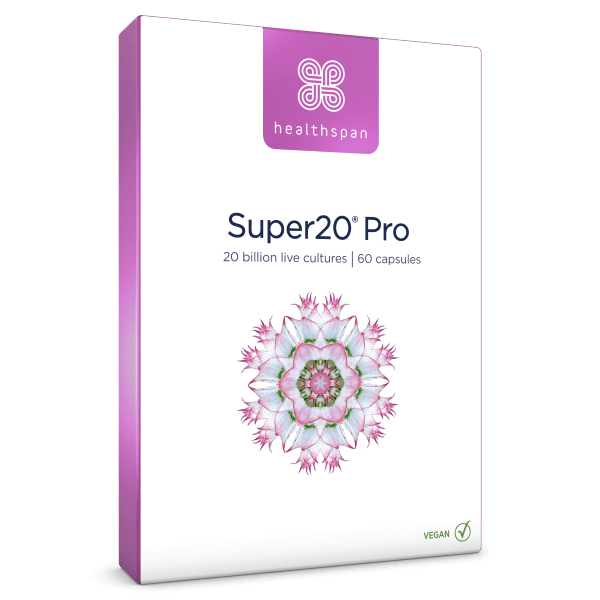Microplastics are everywhere, including in our guts. Could probiotics help combat some of the damage they may cause?
🕒 5 min read
Microplastics – microscopic particles of plastic mainly derived from the breakdown of larger pieces – pollute our soil, rivers, oceans and air, and find their way into our food and our bodies.
Microplastics in food are present in seafood, meat, fast foods and drinks, table salt, sugar, honey, tap and bottled water, to name but a few. In our bodies microplastics lodge themselves in our tissues and organs including our digestive system, blood, liver, pancreas, heart and brain.
What are microplastics?
Microplastics are microscopic particles of plastic less than five millimetres in size. At less than 100 nanometres in size, nanoplastics are even smaller: less than 100 nanometres (10,000th of a millimetre) in diameter.
How do microplastics get into the environment?
Most microplastics derive from the breakdown of bigger pieces of discarded plastic. Industrial waste, car tyres, synthetic materials like polyester, fishing tackle such as nets and lines, as well as microfibres shed from synthetic clothing in the washing machine are common sources.
And, while plastic 'microbeads' in bathroom products such as face scrubs, soaps, toothpaste and shower gels have been banned in the UK since 2018, they are still present in products such as lipsticks and paint.
How much is in our bodies?
According to research, we each consume tens of thousands of microplastics each year, although exactly how many is debated. A 2019 report from the World Wide Fund for Nature suggests an average of 2,000 microplastic particles a week, equating to around 21 grams a month and just over 250 grams a year, and like consuming a credit card a week. Another study claims that we consume the equivalent of 50 plastic bags a year in microplastics.
A 2019 Canadian study suggests that someone meeting the recommended water intake of eight glasses of water a day solely by drinking bottled water could be consuming an extra 90,000 microplastics each year compared to someone who meets their water requirement from tap water alone (4,000 microplastics).
Babies are thought to be exposed to especially high levels of microplastics passed on via the placenta and after birth via breast milk, plastic feeding bottles and teething toys.
How may microplastics affect the gut?
Microplastics enter our bodies via the mouth, oesophagus, stomach, and intestines, meaning their effects are often first seen in the gut (the gastrointestinal tract). Although to date most studies have been carried out in animals or cell cultures, numerous studies suggest that microplastics can breach the layer of mucus that lines the gut and disrupt the gut microbiome: the collection of bacteria and other organisms that help protect us against disease.
The studies
- A review published in July 2023 suggests that microplastics may damage the mucus layer lining the gut, damaging our ability to metabolise fatty acids and amino acids and leading to high levels of blood fats. This mucus layer is important for absorption and digestion, as well as helping to defend us against toxins in food.
- A 2022 French lab study found that exposure to microplastics promoted the production of two 'pathobionts', or 'bad' bacteria, at the expense of the production of two species of 'good bacteria' in the gut.
- A 2023 US study found that high concentrations of polystyrene microplastic particles triggered secretion of inflammatory chemicals linked to inflammatory bowel diseases (IBD) like ulcerative colitis and Crohn's disease.
- A 2021 Chinese study revealed that Inflammatory Bowel Disease (IBD) sufferers had a significantly higher concentration of microplastics in their stools. The researchers suggest that plastic packaging may be linked to the disease process in IBD. They also surmise that IBD may exacerbate the retention of microplastics.
- A 2019 German study suggests that an imbalance in gut bacteria (dysbiosis) may alter the immune system and trigger chronic diseases, as well as leaving us open to infections and changing which genes are 'turned on' by gut bacteria.
Probiotics for gut health
Although research is still at an early stage there are promising signs that probiotics, found in fermented foods such as yoghurt, aged cheeses, kefir, kimchi and kombucha, and in supplements and probiotic tablets or capsules, may help mitigate the potential damage caused by microplastics.
Probiotics are live microorganisms that can help to improve or restore the gut microbiota. Find out more about probiotics and what they do.

Super20 Pro
Best-selling probiotic
- 20 billion live cultures from 5 well-researched strains
- Contains Lactobacillus acidophilus, Lactobacillus paracasei, Bifidobacterium lactis and Bifidobacterium bifidum
- Supports the protective intestinal microflora in the gut
The studies
- A 2023 review published in Frontiers in Food Science suggests that probiotics may help beat toxicity from polystyrene nanoplastics and microplastics. How? The researchers suggest that they may produce specific compounds or trigger a chain reaction that helps to boost the immune response or dampen down inflammation.
- The same review suggests that probiotics can detoxify heavy metals such as lead, cadmium, copper and mercury, which microplastics attract, as well as binding to harmful molecules and toxins found in microplastics.
- A 2020 study found that a multi-strain probiotic reduced inflammation and had protected the liver, kidneys and spleen and balanced blood glucose and blood fats caused by phthalates and BPA, at least in rats.
- The probiotic used contained Saccharomyces boulardii, found in cheese, kefir and kombucha, Lactobacillus rhamnosus, found in kimchi, sauerkraut, tempeh, and miso and Lactobacillus planarum, found in such as sauerkraut, pickles, brined olives, kimchi, sourdough, and some cheeses as well as in a variety of probiotic supplements.
- A 2019 Chinese study found that the probiotic Lactobacillus reuteri, found in cheeses such as Gruyere and Parmigiano Reggiano as well as in supplements, can degrade bisphenol A (BPA) – an industrial chemical and 'hormone disruptor' found in baby bottles, plastic water bottles, and hygiene products.
- A 2020 Iranian study found that full-fat yoghurt prepared with the probiotics Lactobacillus plantarum and Lactobacillus acidophilus L. plantarum decreased the level of BPA in the yoghurt by 82.8% and 43.4% respectively. Yoghurt and other dairy products can be contaminated with BPA from plastic coatings used in containers and in manufacture.
A 2023 review suggests that anthocyanins – blue, red and purple plant chemicals from the polyphenol family – may ease the toxic effects of polystyrene by promoting their excretion. Find anthocyanins in blueberries, strawberries, mulberries, blackberries and in other berries and supplements.







